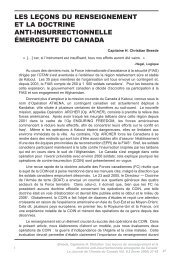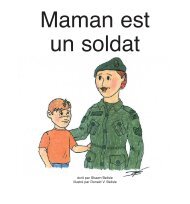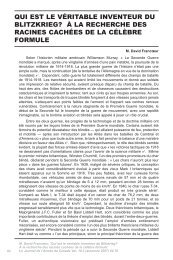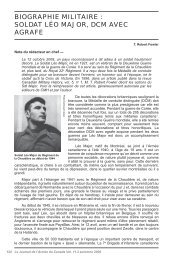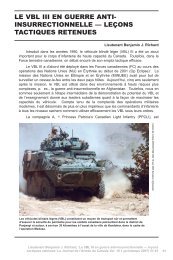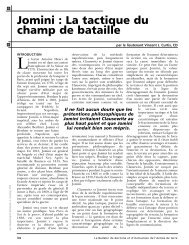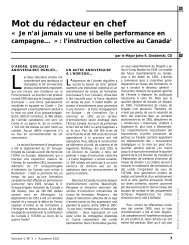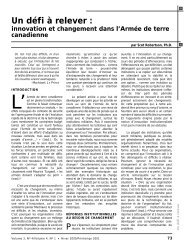The Canadian Army Journal
The Canadian Army Journal
The Canadian Army Journal
You also want an ePaper? Increase the reach of your titles
YUMPU automatically turns print PDFs into web optimized ePapers that Google loves.
Since 1945, only one major expeditionary counter-insurgency operation involving<br />
Western armed forces was successful: the Malayan Emergency (1948-1960). This<br />
operation is of questionable relevance to the Afghan and Iraqi conflicts because it was<br />
unique in many ways. <strong>The</strong> insurgents in Malaya were mostly from a minority group that<br />
was easily identifiable: Chinese Malays. <strong>The</strong>y received relatively little external support<br />
so that the international dimension of the conflict remained limited in scope. <strong>The</strong> British<br />
government had already sold its solution, independence, to the majority of the population<br />
before the insurgency became a serious problem. Finally, the British public was not<br />
much involved or interested in the counter-insurgency or aware of its fate, and thus had<br />
a limited impact on the campaign’s conduct and outcome. In other words, the Malayan<br />
insurgency, in contrast to most counterinsurgencies involving Western armed forces in<br />
an expeditionary operation, is not good example by which to approximate the more<br />
complex conflicts in Afghanistan and Iraq. Since the Malayan Emergency there have<br />
been some minor operations that were successful, such as those in Brunei (1962-1966)<br />
and Oman (1962-1976), but the very fact that they were perceived as minor operations<br />
limits their utility for comparison to today’s counter-insurgency challenges. Perhaps<br />
keeping counter-insurgency operations outside the realm of public affairs is the key<br />
lesson to be learned from these three operations, but in our increasingly globalized<br />
world, this option is less and less probable. Furthermore, the present-day challenges<br />
are already out in the open and require strategic solutions to succeed.<br />
Three French Experiences in Counter-insurgency<br />
Over the last 200 years, the French <strong>Army</strong> has engaged in many counter-insurgency<br />
campaigns. Although the best known ones, Indochina (1945-1954) and Algeria<br />
(1954-1962), were strategically unsuccessful, France had been quite successful in the<br />
19 th century, like most other colonial powers, in meeting challenges to its rule. Some<br />
contend that insurgents of the 19 th century were less organized, numerous and well<br />
equipped than those of the 20 th century and that it is therefore, perilous to make<br />
comparisons. 4 This study takes issue with this assertion. As the case study of France’s<br />
conquest of Algeria in the 19 th century shows, the enemy was able to mount an effective<br />
and well-thought-out resistance organized around an Islamist ideology. Despite the<br />
massive military advantage of the French, it was almost successful in defeating the<br />
<strong>Canadian</strong> <strong>Army</strong> <strong>Journal</strong> Vol. 11.1 Spring 2008<br />
Combat camera AR2006-A01-438<br />
9


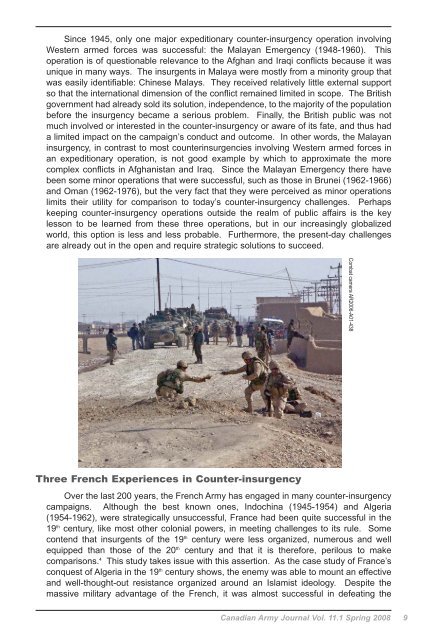
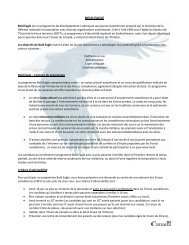
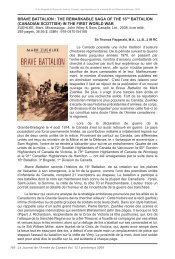
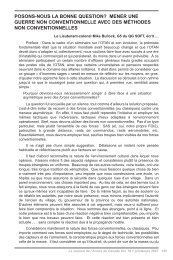

![La modularite dans l'Armee de terre canadienne [pdf 1.6 MB]](https://img.yumpu.com/17197737/1/188x260/la-modularite-dans-larmee-de-terre-canadienne-pdf-16-mb.jpg?quality=85)
